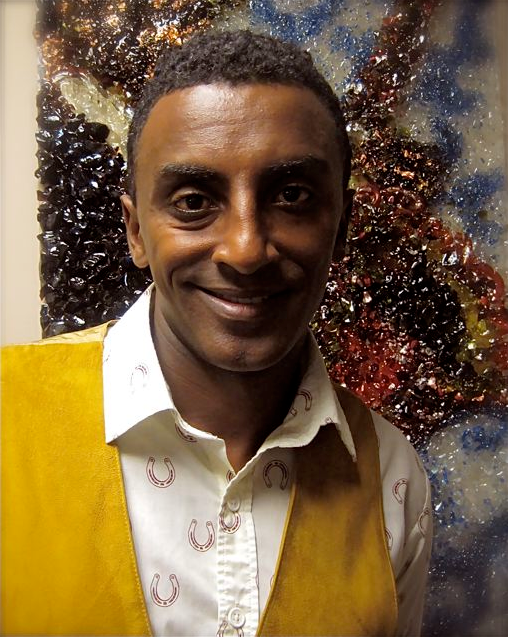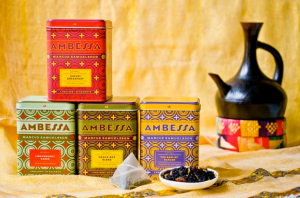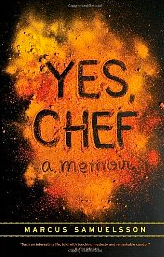Jordan Wright
August 7, 2012
Special to Washington Life

Top Chef Master Marcus Samuelsson at the Howard Theatre, Washington, DC – photo credit Jordan Wright
A child is seated on the grass in the Land of the Midnight Sun, his attention drawn downward by a clump of flowers. They are everywhere stretching across the rolling hillside as far as the eye can see, but he is focused on collecting specific elements for a simple bouquet clutched in his tiny left hand. A striped knit cap is pulled down tightly over his head. He is five. He appears curious and self-assured, methodical and intense, traits he evidences in no small measure to this day. The scene is from a black and white photograph out of Marcus Samuelsson’s latest book, “Yes, Chef”, an autobiographical journey that opens with his earliest memories of his adoption from his native Ethiopia. 3,700 miles as the crow flies, to Sweden.
Marcus Samuelsson’s ascendancy to Top Chef Master is no fluke. Hard work, numerous television appearances and a slew of cookbooks have shown a bright light on his skills and restaurants. His unique path to a life in professional kitchens began when he was cut from his small town of Göteborg’s soccer club because of his slight frame. “I sometimes think of myself more as a failed soccer player than an accomplished chef,” he admits.
For a while he knocked around a few local restaurants until landing in Switzerland where he trained under the old European hierarchical system where Larousse Gastronomique and Escoffier’s Le Guide Culinaire were the bibles of French cooking. There he was put to the test in a brutally exhaustive regime fraught with demeaning work, withering insults from head chefs and inhumane hours. The system offered internships to Michelin-starred restaurants where the treatment of young chefs was equally as intense. Samuelsson not only survived, unlike many of his peers, but thrived, learning the intricacies and pitfalls of the business from the inside out and perfecting a disciplined mind that would rival that of an Eastern mystic.
Over the years and throughout his travels Samuelsson kept a diary of his food experiences carefully recording the regional dishes he learned to prepare and daydreaming about how he would do them differently when the time came to open his own restaurant – a time that would come when he could at last merge international flavors with traditional cuisine. That day came in 2011 with the opening of Red Rooster in New York’s Harlem where he has put down roots in the city he has come to call his own.
Last month I sat down with him in the newly restored Howard Theatre in Washington, DC where he has created the venue’s current menu and where he was preparing to discuss and sign his latest book along with an onstage cooking demo. He kindly brewed me a cup of Choco Nut Blend from his new line of Ambessa specialty teas he has created this year for Harney and Sons.
Jordan Wright – You say in your book that a jazz musician looks for a new kind of perfect as going “deep in the shed”. Does that apply to you?
Marcus Samuelsson – Yes! Well, sometimes. For me perfection can be different things. When I started cooking French food we were serving only about two percent of the population. Now I find perfection in berbere [an Ethiopian spice mix] and the countryside of Ethiopia where I’ve found the smells and flavors that I didn’t know how to value earlier in my life. Perfection can mean different things at different times in your life.
JW – You mention in your book wanting to hang out with Keith Haring and Madonna. Who would you like to hang out with now that you haven’t yet met?
MS – It’s been planned for me to cook for Nelson Mandela and that would be really nice. It just hasn’t worked out yet.
JW – Who are the chefs that you most admire today?
MS – My grandmother, who was not a professional but got me going, Charlie Trotter who embraced me early in my career, and I love what Alice Waters has contributed to American cooking. Also I look up to Daniel Boulud and the so many of the unknown chefs who are not yet recognized for their craft.
JW – Are you working with any new ingredients?
MS – Well, not new. I love discovering the ancient Ethiopian foods and presenting them to a non-Ethiopian crowd. It’s fun to treat things a little bit differently like using the chili-like berbere with chocolate or on popcorn.
JW – Who’s been the greatest influence in your life?
MS – My mom and my dad who always gave me guidance. My grandmother giving love and cooking, my parents for my schooling, and my Ethiopian mother who gave me the ultimate sacrifice by making sure we [Samuelsson’s sister was adopted into the same family] would survive.
JW – Your book has a powerful message to future chefs that they should be tough, detailed and methodical. Do you think artistry ever trumps hard work?
MS – Cooking is a great craft because it’s a balance between craftsmanship, traditions, storytelling, artistry, finance and marketing. It’s all of those things.
JW – Do you believe that people have an innate talent for cooking?
MS – I’m a firm believer that you have to work on your talent constantly. I’m always traveling and asking myself questions. Talent will get you in the room, but it’s not going to help if you don’t have a good work ethic and curiosity. It’s evolution, evolution, evolution!
JW – Was the White House State Dinner for the Prime Minister of India hosted by the Obamas one of the highlights of your career?
MS – Absolutely! It was a huge honor to be a part of the team on such a big day where so much of the cooking came down to care as well as research.
JW – Let’s talk about your experience on Top Chef Masters.
MS – I learned so much from being with Susan Feniger and Jonathan Waxman, friends that I so much admire, American chefs that came from California and were part of a cuisine revolution that we didn’t have in Europe. What’s great about the show was sitting around before the filming and listening to how they started in a truck back in the 70’s with no money. It was very inspirational. I remember moments that were not caught on tape like when my back went out and Susur Lee was giving me a massage because I could not move. There was such a camaraderie there that you cannot describe.
JW – Do you want to talk about the menu you’ve created for tonight?
MS – It’s really a fun menu. I will celebrate Sweden with its gravlax, go into Harlem with the fried chicken, and then there’s a hash that features Ethiopian flavors, finishing with the chocolate pancake with roasted cherries and blueberries. It’s comfort food and all the things that speak home to me. I’m really excited to be here in the historic Howard Theatre and to witness the resurgence of the neighborhood.
This interview was conducted, condensed and edited by Jordan Wright.


Leave a Reply